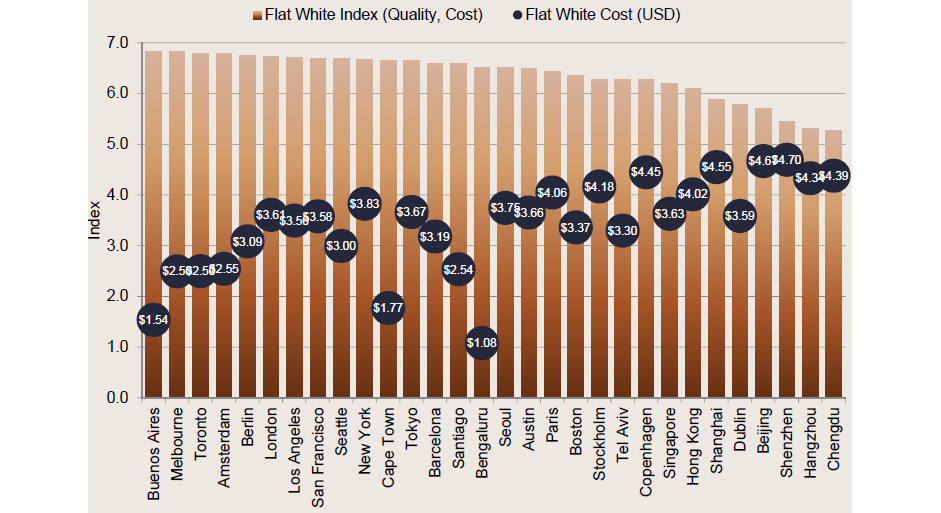
The traditional way of making a signature Vietnamese coffee.
This year marks the third iteration of Savills Tech Cities programme, and again a key component of our index is our popular ‘Flat White Index’.
The best and the brightest in the tech industry tend to have their pick of roles, and may not be loyal to a particular location, so a city’s environment, nightlife and leisure offer can be as important as the remuneration on offer to them when taking a role.
It may seem a little frivolous, but the cost of a flat white and the quality of the cafés that serve them can therefore be used as a partial proxy of a city’s wider lifestyle offer (as well as an indication of where’s good for casual business networking) and help us see where’s likely to be popular with people who prioritise this.
This year, Buenos Aires is the flat white capital of the world, followed by Melbourne then Toronto, according to the scoring of the quality of cafés and the cost of a flat white across our 30 cities.
Buenos Aires tops the ranking based on the cost and quality of flat whites, where a cortado can be found for US$1.54, the third cheapest in the world due to current exchange rates.
The most expensive flat white can be found in Shenzhen, China, where caffeine lovers can expect to pay US$4.70, largely due to the flat white’s present scarcity across the country, although the price may come down in the near future.

Savills Flat White Index 2019.
Tea has historically been the nation’s beverage of choice, but Chinese millennials are rapidly embracing new tastes: Starbucks has recently announced it intends to double its presence across the country in the next five years, taking it up to 3,000 outlets, so we may well see prices in China drop in future indices, as the flat white becomes more common.
New York, which tops Savills overall Tech Cities Index is 10 in the table for flat whites, while San Francisco (2nd overall) is in eighth place, and London (3rd overall) is in sixth position, showing that established tech cities are also no slouches when it comes to keeping their tech workers caffeinated, with beverages available at a wide range of outlets at sub-US$4.
Ultimately, a city is not going to succeed or fail on the basis of its café culture, but the presence of one does indicate that its wider environment lends itself to human interaction, socialising and networking – without one, a city may not be somewhere people want to live and ultimately not where tech companies want to locate.
Sharing the same opinion, Mr. Bui Trung Kien, Associate Director Head of Commercial Leasing, Savills Hanoi comments: “Coffee has become such an essential part of corporate culture worldwide that café is now a first – priority amenity in office buildings, along with ATMs.”
Young workers nowadays usually socialise, work remotely, and have casual business meetings in a café. This behaviour partially explains the development of co-working space – an alternative office concept which integrates F&B facilities, open & social settings of a cafe in workspace.
Mr Kien stresses that Vietnam is no exception to this worldwide trend where co-working model was first introduced in 2012 and has been growing exponentially (58% growth rate of supply over the past few years). With a strong and healthy coffee culture being the second largest coffee exporter in the world, Vietnam cities are expected to be well-positioned against other cities.


















